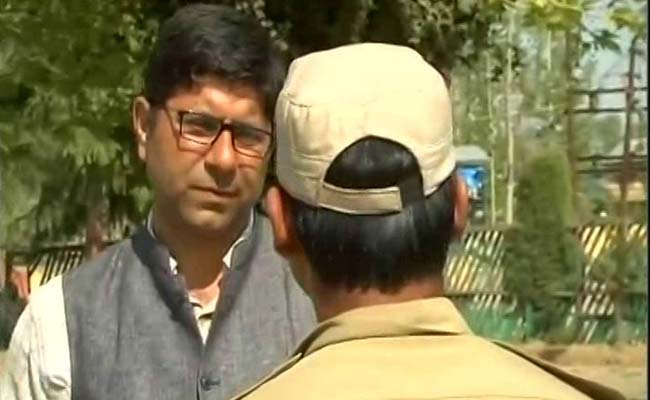The fight against militancy in Kashmir has got tougher as people give a protective cover to militants.
Srinagar:
The last one year has proved to be extremely difficult for the policemen in Kashmir. Given the mass uprising and unrest, the local policemen are fighting against the very society they belong to. The protesters, stone-pelters or militants, are none other than their own relatives or neighbours.
In South Kashmir's Pulwama district, one of the worst-hit areas by militancy and unrest, it a Catch-22 situation for Fayaz Ahmad, a police constable.
For cops like Mr Ahmad, fighting militancy or dealing with stone throwing crowds is a daily routine. But the recent advisory from the Jammu and Kashmir Director General of Police that cops should avoid visiting their homes for the next few months doesn't seem to have gone down well. The advisory was issued after militants raided houses of several policemen in Shopian and Pulwama districts in the last week.
"We will not be scared. I will go home. We have families and we have to go. Militants also have families but we never harass them," says Mr Ahmad.
 It's a delicate situation for Mr Ahmad to perform his duty and ensuring safety of his family. The fight against militancy has got tougher because people openly give a protective cover to militants whenever police and security forces launch anti-militancy operation, say officials. More than militants, it's the overwhelming support for militancy, which is posing a bigger challenge for cops, they say. But Mr Ahmad is determined to fight them.
It's a delicate situation for Mr Ahmad to perform his duty and ensuring safety of his family. The fight against militancy has got tougher because people openly give a protective cover to militants whenever police and security forces launch anti-militancy operation, say officials. More than militants, it's the overwhelming support for militancy, which is posing a bigger challenge for cops, they say. But Mr Ahmad is determined to fight them.
"We have to fight against militancy. We will fight and we will not be afraid of anything," he said.
The most disturbing aspect of the situation for local policemen is the hostile crowds, and visiting families has become a challenge.
"It's difficult for local policemen. We have to do our job and at the same time save our lives from stone-pelters," said a cop from Pulwama.
"We are not scared, but we have to hide our identity when we go home. We don't wear uniform. At some places they (protesters) set up checking points and check out identity cards," he said.
After last year's unrest, more than 90 young people in south Kashmir have joined militant groups. In many areas they move freely, attacking mainstream political workers and threatening families of policemen. Police admit that massive public support for terrorists and stone-pelting is posing a major challenge.
"It's a tough job and stressful times because their homes are being targeted. They are being thrashed and if they are not at home, calls are being made to their families threatening and pressure tactics are being made," said Rayees Bhat, Senior Superintendent of Police, Pulwama.
In South Kashmir's Pulwama district, one of the worst-hit areas by militancy and unrest, it a Catch-22 situation for Fayaz Ahmad, a police constable.
For cops like Mr Ahmad, fighting militancy or dealing with stone throwing crowds is a daily routine. But the recent advisory from the Jammu and Kashmir Director General of Police that cops should avoid visiting their homes for the next few months doesn't seem to have gone down well. The advisory was issued after militants raided houses of several policemen in Shopian and Pulwama districts in the last week.
"We will not be scared. I will go home. We have families and we have to go. Militants also have families but we never harass them," says Mr Ahmad.

For policemen in Kashmir, fighting militancy or dealing with stone throwing crowds is a daily routine
"We have to fight against militancy. We will fight and we will not be afraid of anything," he said.
The most disturbing aspect of the situation for local policemen is the hostile crowds, and visiting families has become a challenge.
"It's difficult for local policemen. We have to do our job and at the same time save our lives from stone-pelters," said a cop from Pulwama.
"We are not scared, but we have to hide our identity when we go home. We don't wear uniform. At some places they (protesters) set up checking points and check out identity cards," he said.
After last year's unrest, more than 90 young people in south Kashmir have joined militant groups. In many areas they move freely, attacking mainstream political workers and threatening families of policemen. Police admit that massive public support for terrorists and stone-pelting is posing a major challenge.
"It's a tough job and stressful times because their homes are being targeted. They are being thrashed and if they are not at home, calls are being made to their families threatening and pressure tactics are being made," said Rayees Bhat, Senior Superintendent of Police, Pulwama.
Track Latest News Live on NDTV.com and get news updates from India and around the world

